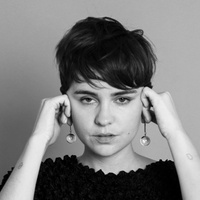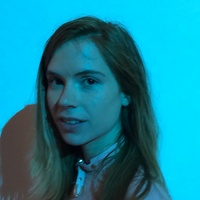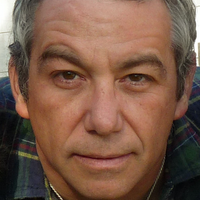As told to Hether Fortune, 2497 words.
Tags: Music, Inspiration, Adversity, Mental health, Multi-tasking, Day jobs.
On the relationship between art and mortality
Musician Emily Cross on the path that led her to working as a death doula, creating unusual parameters for yourself to make new things and eschew expectations, and always being mindful of using your time in this world to focus on what you love.I know that you are working as a death doula, or end-of-life doula, and I’m curious what path led you to that? How does one get into that in the first place?
I heard the term “death doula” on the radio one morning. I think it was a piece about a specific death doula. I don’t even know who it actually was, but she was explaining what she did and I was like, “Oh, that sounds exactly like what I would want to be doing.” I was looking for something other than music to transition into as a career, and it seemed like a good thing to investigate, so I went home and immediately found this training program. I did it and six months later I took another training program through the University of Vermont and then after that I established my own practice.
Why were you looking to find something to do that was different from music? Were you burnt out?
No, I think I was just looking for something that I could do alongside music, because music kind of ebbs and flows and I don’t look at music particularly as a career. My goal with music is not to be “successful” or sell a ton of records or get lots of recognition or anything like that. Of course, I don’t want to lose money and I want to share my music with other people, but I don’t see it as a way to make a living and be a main source of income when I’m older. I know some people who put all of their energy and attention into making music and that’s amazing, but I have a lot of interests and passions and I don’t think that I am the kind of person to put 110% into just music.
Has your work as a death doula informed your creative process?
Death has always been a big part of my writing process, and thinking about mortality has always been a theme throughout my work. One of the reasons why I thought being a death doula would be a good fit for me was because I was already interested in mortality. I’ve been thinking about mortality and death and how, as an American society and culture, we deal with it. I think, if anything, it’s given me more of a feeling of freedom. Musically, I don’t feel like I should be tied to anything specifically that fits into any sort of box or anything like that. My goal is just to express myself and have fun and not get too bogged down with everything having to be perfect. There’s still quite a large deal of control that I have trouble giving up, but I think working so closely with people who are dying helps me to work a little more immediately, maybe.
I understand that you’re going to be conducting living funeral ceremonies while you’re out on the road on tour as a separate event. Can you tell me about that?
I found out about living funerals through a documentary about South Korean mock funerals. I thought it was fascinating. They’re just extreme exercises in confronting mortality. You are basically going to your own funeral and you die in a group setting. You’re role-playing your last day on earth, essentially, and you get laid to rest. It’s very intense and moving and transformative. While I was watching the documentary I thought, “This is so cool. I want to go to one,” but I couldn’t find any here in the U.S., so I figured out how to do them here. I wrote my own script, got my own materials, and I started doing them in 2017. Now I actually train people all around the world to do it. I’m excited to bring this on tour. So yeah, they’re going to be separate events, but generally either the day before the show or the day of the show or the day after the show in certain cities.
That sounds exhausting.
Yeah. I don’t know what I was thinking. It’s very me to do something like that, to just put an insane amount of stuff on my plate. But ultimately I think that it makes a lot of sense to, while I’m on the road, also do this. And I’m super passionate about it, so I think it’ll be worth it.
As you mentioned earlier, American and western culture in general has a long way to go in terms of being able to discuss and confront death in a healthier, more open way. What are some things you’ve learned about death working as an end-of-life doula that you didn’t think about or know before?
When I first started this job, or investigating this job, I didn’t know quite how messed up the whole end-of-life process could be for people and their families—how confusing and scary it could be. I guess my preconceived notion was that it’s cut-and-dry and there’s only a certain number of options and that everyone is super kind and understanding of your situation. But that is not usually the case. Actually, at every step of the way it seems people are trying to pull one over on you, whether it be the funeral industry or even people in your own family. Of course, this is not everyone’s experience, but it’s a lot of people’s experiences.
I also didn’t know how unprepared I was for my own death. I thought I was pretty aware of my mortality and ready for that, but on the practical end, in terms of having all my ducks in a row, I had no idea. So I’m really happy that I’ve learned so much about it and been able to help people through it, because in knowing how to navigate the system we can help alleviate a lot of stress for the dying and their families. It is possible for people to have stress-free and beautiful deaths. Even if you’re healthy and young and you don’t really think that you should be thinking about this, anything could happen at any time. Knowing that things have been figured out, at least to an extent, can help ease a very deep anxiety that a lot of people have about death.
Do you have that anxiety?
I have anxiety around not knowing where I’m going to be. For me, the worst thing would be to be in a hospital and being artificially sustained and to die in a hospital setting. That just seems so awful to me.
What was different for you about the process of making your new album, compared to the ways in which you’ve worked on music previously?
I was in Mexico for a month, more or less isolated, and I’ve never written anything so fast in my life. I was just blindly following my intuition and making decisions based on that. I did some thinking afterwards when we were doing pre-production and recording in LA, but when I was actually writing it I wasn’t thinking much at all. I was just kind of making it. I did do a lot of working out of ideas afterwards, but the core of the songs were made there. Before I went I made it very clear to my record label that I might not make anything at all. I needed to feel like there was absolutely no pressure put on me to succeed, because I didn’t want to have to worry about anyone’s expectations. I honestly didn’t know what was going to happen. I knew that I wanted to just feel free and relaxed. I also didn’t bring much. I brought a sequencer, which, looking back, I really don’t know what I was thinking because I’ve never even used a sequencer before. I’m not a technical person at all. I hate reading manuals. I just don’t do it. My brain doesn’t work like that at all. I found out later that I’d brought one of the most complicated pieces of equipment known to man. It’s called the Elektron Octatrack.
Oh yeah. That thing is crazy!
I know, and I just don’t know what I was thinking. I can’t explain it. I just watched a couple of YouTube tutorials of these amazing people who are used to using gear like that. They made it look so easy. And I was like, “Oh, this is cool.” I picked it because I thought it might elicit some happy accidents or produce something that was surprising to me, and I knew on a certain level that it was cool that I didn’t know how to use it. I don’t know. Anyway, I brought that.
It was very punk of you to do that, honestly.
I spent the first couple days trying to read the manual, really giving it a concerted effort, before I gave up trying to understand it. I had all these graphs on the wall… it looked like one of those murder-mystery montages when someone has all the connected pins with the string. It was so funny. I also brought a weird little nylon string bass, a mini bass. I don’t play bass either, by the way.
I love this.
I specifically did not bring a guitar. I guess I was trying to make it a little bit difficult for myself, and also I knew that I wanted the record to be vocal-heavy. So I wasn’t nervous about that, I knew that if nothing else I could just make a few chords on the bass and use my vocals to fill in the ideas. It ended up being really fun. I still don’t know how to use the Octatrack at all but I did make a bunch of stuff on it.
You chose parameters to work within, a specific environment and limited, unfamiliar equipment, which allowed your subconscious to just let things come out rather than being stuck in a pattern that you’re used to working within, which would’ve likely produced less interesting results for you.
Yeah. It was really fun, even though I had a pretty intense schedule for myself. I would wake up at 7:30, have tea, and then around 8:30 I would go in and start working. I would work the whole day, maybe take a break to go swimming in the ocean, but I would get at least eight hours of work in a day. So a lot of what I did I didn’t use, but I would just go in and do whatever for hours and hours and it was really nice to know that I didn’t have to arrive at some place that was usable, it just had to keep coming out. That was the goal.
That reminds me of what you said earlier about how you’re not really looking for a “career” as a musician, but more just experiential freedom. With that in mind, if you were at the end of your life and you were picturing what successes you thought you’d find in your life, whatever they may be, what would that look like to you?
I mean, ultimately I feel that I’ve already been very successful. Just the fact that some people listen to my music, that’s a success to me. I’ve had labels put out my records. That feels like a success. And, of course, having people around me who I care about. That is a success. But I don’t really know what professional success is.
Within the constraints of capitalism and especially in the industry built around the arts and music, which is heavily focused on product and output, the idea of what it means to be accomplished or successful can be very easily skewed. It can be really difficult for artists to deal with.
There’s always a new top. There’s always a new place to be at, it’s never enough.
But it sounds like the work that you’re doing outside of music has helped you cultivate a healthier relationship with the creative process and what accomplishment or success as an artist really means for you.
Definitely. I do feel successful in that way. Just the fact that I am able to make anything at all feels like an accomplishment. I guess that’s where I am with it. Personally, success to me—and a way that I could be more successful—would actually be slowing down even more and caring for myself more.
It’s hard to slow down.
It is so hard. I was just talking to my therapist this morning about that—when you’re so excited about things and you think so many things are important and worth putting time into, it is really hard to slow down and just take a break for a minute.
At the beginning of your record, when you’re asking, “What is your wish?,” it felt like hearing an artist’s subconscious speaking directly to itself, helping you explore uncertainty and acceptance and facing fear and sort of leaning into those things. Maybe that will help you slow down. Maybe you’re already doing it and you don’t even realize it.
Well, I hope so.
I’ve noticed that a lot of artists have been struggling existentially since the 2016 election cycle for a variety of reasons, more so than usual it seems. Does making art feel more important to you now that you are doing this end-of-life work, or does it feel more trivial?
I would say more important. Art and music are really important to me in my soul, so how could that not be worth doing? I was just talking about this with my friend, Thor. He was asking me, should we feel a responsibility to steer our art to worthy causes like making political statements or not making art at all and maybe going and dedicating ourselves to a certain cause that’s really important in the world right now? I have those thoughts too, but for whatever reason, this is what I’m good at. This is what I want to do and this is what I feel energized about doing. I feel like this is how I’m going to be my best self and that’s how I’m the best for the world as well. I see how art impacts people who are dying. It means so much to them. How could that not be worth doing or how could that be futile? We’re all going to die, so you might as well at least spend part of your life doing something you genuinely love, because what if there’s nothing after? Your time is precious, so you might as well enjoy it.
Emily Cross Recommends:
On Death and Dying by Elisabeth Kübler-Ross
Ramblings - Podcast by BBC4
IG account: @wolfgang2242
TV show: Terrace House
best thing to focus to or fall to sleep to: Deep underwater sounds




